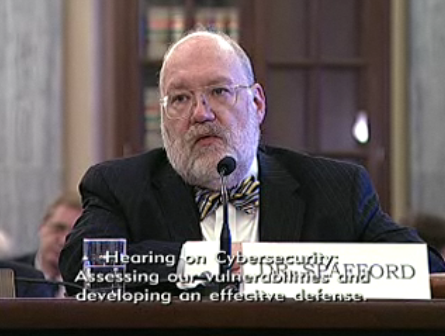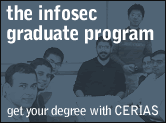Posts tagged video
Page Content
This time, the Senate
On March 19, I had an opportunity to testify before the Senate Committee on on Commerce, Science, and Transportation. The hearing was entitled Cybersecurity -- Assessing Our Vulnerabilities and Developing An Effective Defense.
I was asked to include information on research problems, educational initiatives, and issues regarding the current state of cyber security in the nation. As is usual for such things, the time between the invitation and the due date for written testimony was short. Thus, I didn't have the time to delve deeply into the topic areas, but could only address the things that I already had on hand -- including some posts from this blog that I had written before. The result was a little longer than the other statements, but I think I covered more ground.
One hint for people testifying before Congress on such things: you can't depend on how long you will have for spoken remarks, so be sure any points you want to make are in your written testimony. In this case, the hearing was limited to about 75 minutes because there were several votes scheduled on the Senate floor, and the committee needed to adjourn to allow the Senators to attend the votes. And, as is common for too many hearings, there weren't many of the committee members present; I believe the hearing began with only two of the 25 members present, and some movement of members in and out to reach a maximum of four seated at any one time. In this case, the chair (Senator Jay Rockefeller of West Virginia) apologized to us several times for the low turnout. However, many (all?) of the staff and aides were present, so I'm certain the gist of the testimony presented will be considered.
The Senator made a nice introductory statement.
My written testimony is available on my website as well as the committee site. My oral statement was from rough notes that I modified on the fly as I listened to the other testimony (by Jim Lewis, Eric Weiss and Ed Amoroso). That statement, and the whole hearing, are available via the archived hearing webcast (my remarks start at about 46:30 into the webcast). If I get a transcribed version of those remarks, I will post them along with my written testimony on my website in the "US government" section.
Comments by the other speakers were good overall and I think we collectively covered a lot of ground. The questions from the Senators present indicated that they were listening and knew some of the problems in the area. The comments from Senator Nelson about the intrusions into his systems were surprising: several Senate security staff were present at the hearing and indicated to me that his remarks were the first they had heard of the incidents! So, the hearing apparently set off an incident-response exercise -- separate from responding to my presence in the building, that is. ![]()
Will this hearing make a difference? I don't know. I've been testifying and saying the same things for over a dozen years (this was my 8th Congressional hearing testimony) and things haven't gotten that much better...and may even be worse. Senator Rockefeller has indicated he intends to introduce legislation supporting more funding for students studying cyber security issues. There was some good news coverage of all this (e.g., FCW and CNet).
I am told that there will be more hearings by this committee. Some House committees have been holding hearings too, and the President's 60 day review continues apace. The added attention is great, but with the sudden interest by so many, the result may be more confusion rather than resolution.
Stay tuned.
As a reminder, if you want to know about my occasional postings such as this but don't want to subscribe to the RSS feed, you can subscribe to the mailing list.
Also as a reminder, there is my tumble blog on security issues, with links to items on the news and WWW of possible interest to those who find my ramblings and rants of interest.
Spaf giving testimony to US Congress today
Just a quick note that Eugene Spafford, Executive Director of CERIAS, will be giving testimony this morning at 10 a.m before the House Ways and Means Committee at a “Hearing on Employment Eligibility Verification Systems and the Potential Impacts on SSA’s Ability to Serve Retirees, People with Disabilities, and Workers.” You can view the broadcast live by visiting the hearing’s page and clicking on “Click Here to View Committee Proceedings Live.”
Useful Awareness Videos
The results are in from the EDUCAUSE Security Task Force’s Computer Security Awareness Video Contest. Topics covered include spyware, phishing, and patching. The winning video, Superhighway Safety, uses a simple running metaphor, a steady beat, and stark visual effects to concisely convey the dangers to online computing as well as the steps one can take to protect his or her computer and personal information.
The videos are available for educational, noncommercial use, provided that each is identified as being a winning entry in the contest. In addition to being great educational/awareness tools, they should serve as inspiration for K-12 schools as well as colleges and universities.
Web App Security - The New Battlefront
Well, we’re all pretty beat from this year’s Symposium, but things went off pretty well. Along with lots of running around to make sure posters showed up and stuff, I was able to give a presentation called Web Application Security - The New Battlefront. People must like ridiculous titles like that, because turnout was pretty good. Anyway, I covered the current trend away from OS attacks/vandalism and towards application attacks for financial gain, which includes web apps. We went over the major types of attacks, and I introduced a brief summary of what I feel needs to be done in the education, tool development, and app auditing areas to improve the rather poor state of affairs. I’ll expand on these topics more in the future, but you can see my slides and watch the video for now:

